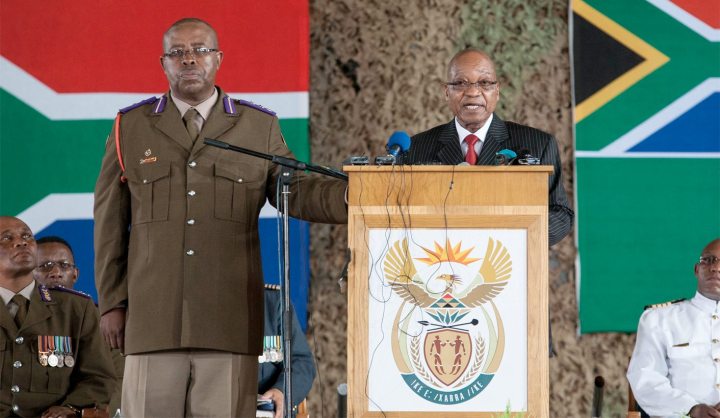South Africa
Analysis: Dying for South African Foreign Policy

President Zuma was not a very happy man at the memorial service for the 13 South African soldiers killed in the Central African Republic. He reacted angrily to reports that there ulterior motives to South Africa’s deployment of troops to the CAR. By KHADIJA PATEL.
Talking at the Swartkop Air Force base on Tuesday, President Jacob Zuma hit out at critics of South Africa’s military deployment to the Central African Republic. He insisted that it was the country’s foreign policy, and not business interests, that had driven his decision to send 200 South African soldiers to a country entangled in a civil war.
And while Zuma protests that allegations of ulterior motives in the deployment of South Africa’s troops to the CAR are tantamount to dishonouring the memory of the fallen soldiers, he neglects to understand as well that the probing of the “actual” motive behind the deployment points to a severe mistrust of Zuma’s administration. The reality is that a great many South Africans, not just us gnats in the media, greeted the news of casualties in CAR with enquiries about the possibility of dubious motives driving the military deployment in CAR.
It certainly is a crazy world where an elected head of state is seen capable of committing men and resources worth millions for a rather slender benefit – and a precarious one at that too.
And while there is still no firm proof linking South Africa’s decision to deploy troops to an actual business transaction in CAR, an actual exchange of South African troops for something else, Zuma asserts that it was South Africa’s foreign policy that drove the deployment.
Zuma said, “Our national servicemen died for a worthy cause. They died in defence of the country’s foreign policy.
“They died defending our commitment to the renewal of the African continent, and to the promotion of peace and stability which would lead to sustainable development in Africa,” Zuma said.
“Our foreign policy is premised on the vision of building a better Africa and a better world.
“It is built on the foundation of Ubuntu and an understanding that we cannot be an island of peace and prosperity if our neighbours still battle with conflicts and poverty. We believe that as an integral part of the African continent, we must develop together with our neighbours in the continent.”
And while Zuma certainly did ennoble South Africa’s foreign policy in his address at the memorial service on Tuesday, the country’s policy towards the rest of Africa and the rest of the world is mostly not driven by altruism.
David Monyae, an independent political analyst, explains that South Africa’s foreign policy – much like any other nation’s foreign policy – serves the country’s national interests as determined by government.
“South Africa’s foreign policy is informed by two core interests, advancing economic goals and national security,” he said.
When he spoke about South Africa’s foreign policy at the University of Pretoria in October 2011, Zuma explained that the country’s foreign policy was independent and that decisions are informed by “national interest”.
“We look at what is of benefit to the South African people, and what will advance our domestic priorities at that given time,” he said.
South Africa’s national interests, among which is the advancement of business goals, are couched in the country’s foreign policy. Commercial interests have always played a major role in the country’s foreign policy. There is little reason for Zuma to be coy about the search for open markets for South African services and goods – the good, the bad and those made in China. Yes, the African Agenda is enshrined in South Africa’s foreign policy, but so too is business as a matter of national interest.
What is, however, becoming increasingly clear, is that sections of South African society are deeply distrustful about how the Zuma administration determines the country’s national interest. DM
Read more:
- South Africa withdraws from CAR in Daily Maverick
Photo: South African President Jacob Zuma














 Become an Insider
Become an Insider